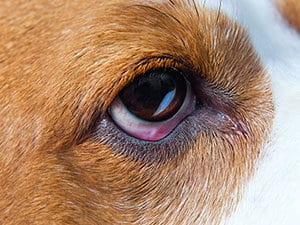
By Dr. Cerny
Surprisingly, dogs have few serious eye injuries. Any injury to the eye can lead to permanent scarring or blindness if penetrating or ulcerative lesions develop. Eye injuries can include scratches, perforating injuries, foreign bodies, and chemical or contact corneal trauma. Any condition that causes your pet to squint or protect his eye, any suspected trauma to the eye, any abnormal appearance of the eyeball or any time the eyelid cannot cover the eye are all absolute medical emergencies.
If you suspect there may be debris or irritation affecting your pet’s eye, you can use an eye wash to clean away foreign objects and to visualize the seriousness of the situation. If your pet is squinting, hiding its eyes from the light, has a raised third eyelid, or has any blood within or around the eye, its time to see the veterinarian without delay. Most veterinarians look at any eye issues as needing priority rather than a wait-and-see approach. Even a minor scratch on the cornea from a thorn or a cinder can lead to consequences that would be disastrous for the pet. Home treatment of eye injuries is not recommended without a veterinarian’s inspection.
Here are some common eye-related questions answered by Dr. Cerny of the Yankee Hill Veterinary Hospital in Lincoln, Nebraska:
How do I know if my dog has an eye problem?
Rubbing or scratching at the eye(s) is a sign of eye pain and discomfort. You may notice your pet has a red eye or that discharge is present.
Any eye problem should be checked out by your veterinarian as soon as possible. Some conditions such as corneal ulcers and glaucoma can result in permanent blindness if not treated immediately.
What is the most common eye disease?
Conjunctivitis (inflammation of the mucous membranes surrounding the eye) is the most common eye disease seen. Common causes include allergies, bacteria, and viruses.
How is conjunctivitis treated?
Eye drops or ointments are often used that contain antibiotics with or without a corticosteroid (i.e. Cortisone, Dexamethasone, Prednisolone). Some pets have chronic conjunctivitis in which long term eye medications are needed.
Dr. Cerny holds a Bachelor of Science degree in Animal Science and Masters in Veterinary Science from the University of Nebraska Lincoln and earned his DVM at Kansas State. He has served several times as a board member for the Nebraska Veterinary Medical Association and is currently on the board for the Lincoln Emergency Clinic. Dr. Cerny & his colleague, Dr. Brown, own and practice at Yankee Hill Veterinary Hospital in Lincoln.










